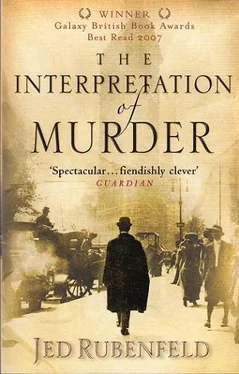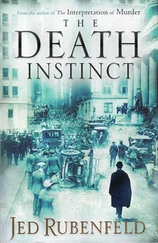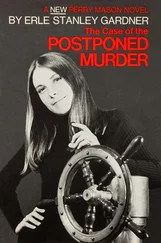Jed Rubenfeld - The Interpretation of Murder
Здесь есть возможность читать онлайн «Jed Rubenfeld - The Interpretation of Murder» весь текст электронной книги совершенно бесплатно (целиком полную версию без сокращений). В некоторых случаях можно слушать аудио, скачать через торрент в формате fb2 и присутствует краткое содержание. Жанр: Исторические приключения, на английском языке. Описание произведения, (предисловие) а так же отзывы посетителей доступны на портале библиотеки ЛибКат.
- Название:The Interpretation of Murder
- Автор:
- Жанр:
- Год:неизвестен
- ISBN:нет данных
- Рейтинг книги:5 / 5. Голосов: 1
-
Избранное:Добавить в избранное
- Отзывы:
-
Ваша оценка:
- 100
- 1
- 2
- 3
- 4
- 5
The Interpretation of Murder: краткое содержание, описание и аннотация
Предлагаем к чтению аннотацию, описание, краткое содержание или предисловие (зависит от того, что написал сам автор книги «The Interpretation of Murder»). Если вы не нашли необходимую информацию о книге — напишите в комментариях, мы постараемся отыскать её.
The Interpretation of Murder — читать онлайн бесплатно полную книгу (весь текст) целиком
Ниже представлен текст книги, разбитый по страницам. Система сохранения места последней прочитанной страницы, позволяет с удобством читать онлайн бесплатно книгу «The Interpretation of Murder», без необходимости каждый раз заново искать на чём Вы остановились. Поставьте закладку, и сможете в любой момент перейти на страницу, на которой закончили чтение.
Интервал:
Закладка:
'Where did the body go?' Hugel replied. 'Did it get up and walk away on its two feet?'
'Look at this,' the mayor replied, gazing at the blueprints. 'This is the Manhattan Bridge. It has cost thirty millions to build. I will open it this year, if it is the last thing I do in office. This arch on the New York side is a perfect replica of the St. Denis portal in Paris, only twice the size. A century from now, this bridge — '
'Mayor McClellan, the Riverford girl — ' 'I know about the Riverford girl,' McClellan said with sudden authority. He looked Hugel full in the face: 'What am I supposed to tell Banwell? What is he to tell the girl's wretched family? Answer me that. Of course there should have been an investigation; you should have completed it long ago.'
'I?' asked the coroner. 'Long ago?'
'How many bodies have we lost in the past six months, Hugel, including the two unaccounted for after we repaired the leak? Twenty? You know as well as I do where they are going.'
'You are not suggesting that I — '
'Of course not,' said the mayor. 'But someone on your staff is selling our cadavers to the medical schools. I am told they are worth five dollars a head.'
'Am I to blame,' responded Hugel, 'with the conditions I am given — no protection, no guards, the corpses piling up, no room for them all, sometimes rotting before they can be disposed of? Every month I have reported on the humiliating conditions at the morgue. But you leave me in that rabbit warren.'
'I am sorry for the state of the morgue,' said McClellan. 'No one could have managed half so well as you have, given the resources. But you have turned a blind eye to this stealing of cadavers, and I am about to pay the price for it. You will interrogate every member of your staff. You will contact every medical school in the city. I want that body found.'
'This body is not at a medical school,' the coroner objected. 'I had already performed the autopsy. I had ventilated the lungs, for God's sake, to confirm asphyxiation.'
'What of it?'
'No medical school wants a cadaver after an autopsy. You want your body intact.'
'So the thieves made a mistake.'
'There was no mistake,' said the coroner vehemently. 'The man who murdered her stole her body.'
'Control yourself, Hugel,' said the mayor. 'You are wild.'
'I am in perfect control.'
'I don't take your meaning. You are saying that Miss Riverford's murderer broke into the morgue last night and absconded with his victim's corpse?'
'Precisely,' said Hugel.
'Why?'
'Because there is evidence on the girl, on her body, evidence he did not want us to have.'
'What evidence?'
The coroner's jaws were working so hard his temples had turned a shade of plum. 'The evidence is — it is — I am not yet sure what it is. That is why we must get the body back!'
'Hugel,' said the mayor, 'you have locks on the morgue, do you not?'
'Certainly.'
'Good. Was the lock broken this morning? Was there any evidence of a burglary?'
'No,' Hugel allowed grudgingly. 'But anyone with a decent skeleton key — '
'Mr Coroner,' said McClellan, 'here is what you will do: make it known to your people immediately that there will be a fifteen-dollar reward to whoever "finds" the Riverford girl at one of the medical schools. Twenty-five dollars if they find her today. That will bring her back. Now: you will excuse me; I'm very busy. Good day.' As Hugel reluctantly turned to leave, the mayor suddenly looked up from his desk. 'Wait a moment. Wait a moment. Did you say the Riverford girl was asphyxiated?'
'Yes,' said the coroner. 'Why?'
'How asphyxiated?'
'By ligature.'
'She was garroted?' asked McClellan.
'Yes. Why?'
The mayor ignored the coroner's question for a second time. 'Were there any other wounds on her body?'
'It was all in my report,' answered the aggrieved Hugel, to whom the knowledge that the mayor had not read his report was a fresh indignity. 'The girl was whipped. There were lacerations on the posterior, spine, and chest. In addition, she was cut twice, by an extremely sharp blade, at the intersection of the S-two and L-two dermatomes.'
'Where? In English, Hugel.'
'On the upper inner thigh of each leg.'
'In the name of God,' replied the mayor.
I went down for a late breakfast, trying to sort out my encounter with Miss Acton. Jung was there, reading an American newspaper. I joined him. The others had set off for the Metropolitan Museum. Jung stayed behind, he explained, because he was going to pay a call this morning on Dr Onuf, a neuropsychiatrist at Ellis Island.
It was my first time alone with Jung. He appeared to be in one of his animated, outgoing moods. He had slept all yesterday afternoon, he said, and the long nap had done him a world of good. Indeed, the pallor that had worried me yesterday was visibly improved. His opinion of America, he told me, was also improving. 'Americans merely lack literature,' he said, 'not all culture.'
Jung meant this, I think, as a compliment. Nevertheless, wanting to show that Americans were not entirely illiterate, I described to him the story of the Astor Place Shakespeare riot.
'So the Americans wanted a muscular American Hamlet,' Jung mused, shaking his head. 'Your story confirms my point. A masculine Hamlet is a contradiction in terms. As my great-grandfather used to say, Hamlet represents man's feminine side: the intellectual, the inward soul, sensitive enough to see the spiritual world but not strong enough to bear the burden it imposes. The challenge is to do both: to hear the voices of the other world but live in this one — to be a man of action.'
I was puzzled by the 'voices' Jung referred to — perhaps the unconscious? — but delighted to find he had an opinion about Hamlet. 'You are describing Hamlet almost exactly as Goethe did,' I said. 'That was Goethe's explanation of Hamlet's inability to act.'
'I believe I said it was my great-grandfather's view,' Jung replied, sipping his coffee.
It took me a moment. 'Goethe was your greatgrandfather?'
'Freud prizes Goethe above all poets,' was Jung's reply. 'Jones, by contrast, calls him a dithyrambist. Can you imagine? Only an Englishman. I cannot understand what Freud sees in him.' The Jones to whom Jung referred was surely Ernest Jones, Freud's British follower, now living in Canada and expected to join our party tomorrow. I had concluded that Jung meant to avoid my question, but then he added, 'Yes, I am Carl Gustav Jung the third; the first, my grandfather, was Goethe's son. It is well known. The allegations of murder were of course ridiculous.'
'I didn't know Goethe was accused of murder.'
'Goethe — certainly not,' Jung answered indignantly. 'My grandfather. Evidently I resemble him in every way. They arrested him for murder, but it was a pretext. He wrote a murder novel, though, The Suspect — quite good — about an innocent man charged with murder; or at least one supposes him innocent. That was before von Humboldt took him under his protection. You know, Younger, I could almost wish your university had not bestowed equal honors on Freud and myself. He is very sensitive on such matters.'
I could not well reply to this abrupt turn in Jung's conversation. Clark was not bestowing equal honors on Freud and Jung. As everyone knew, Freud was the centerpiece of Clark's celebration, the keynote speaker, delivering five full lectures, while Jung was a last-minute substitute for a panelist who had canceled.
But Jung did not wait for an answer. 'I understand you asked Freud yesterday if he was a believer. A perceptive question, Younger.' This was another first: Jung had not previously shown a favorable reaction to anything I said. 'No doubt he told you he was not. He is a genius, but his insight has endangered him. One who spends his whole life examining the pathological, stunted, and base may lose sight of the pure, the high, the spirit. I for one don't believe the soul is essentially carnal. Do you?'
Читать дальшеИнтервал:
Закладка:
Похожие книги на «The Interpretation of Murder»
Представляем Вашему вниманию похожие книги на «The Interpretation of Murder» списком для выбора. Мы отобрали схожую по названию и смыслу литературу в надежде предоставить читателям больше вариантов отыскать новые, интересные, ещё непрочитанные произведения.
Обсуждение, отзывы о книге «The Interpretation of Murder» и просто собственные мнения читателей. Оставьте ваши комментарии, напишите, что Вы думаете о произведении, его смысле или главных героях. Укажите что конкретно понравилось, а что нет, и почему Вы так считаете.












